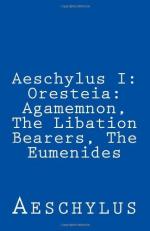|
This section contains 8,633 words (approx. 29 pages at 300 words per page) |

|
SOURCE: "Aeschylus' Women," in Helios, n.s. Vol. 10, No. 1, Spring, 1983, pp. 23-47.
In this essay, Podlecki examines Aeschylus's presentation of women in his plays, in a effort to "refute any charge of male chauvinism against the dramatist. " Aeschylus's female characters, he insists, "are handled in a life-like and convincing way, with sensitivity and understanding. "
In den aeschyleischen Tragödien sind Weiber und Orientalen ähnlich unbeherrscht in Glück und Unglück, in Freude und Trauer, sklavisch feig oder despotisch frevelnd, üppig, dem Augenblick verfallen, ohne Verlass und ohne Vernunft. … In der Ehe, wie im Staat, bedarf die Frau in den Augen des Aeschylus der festen Hand und der lenkenden Besonnenheit des Mannes.
In Aeschylus' tragedies women and orientals are similarly lacking in self-control both in good fortune and misfortune, in joy and sorrow; slavishly, cowardly, or despotically criminal; voluptuous; under the spell of the immediate; lacking in dependability...
|
This section contains 8,633 words (approx. 29 pages at 300 words per page) |

|


